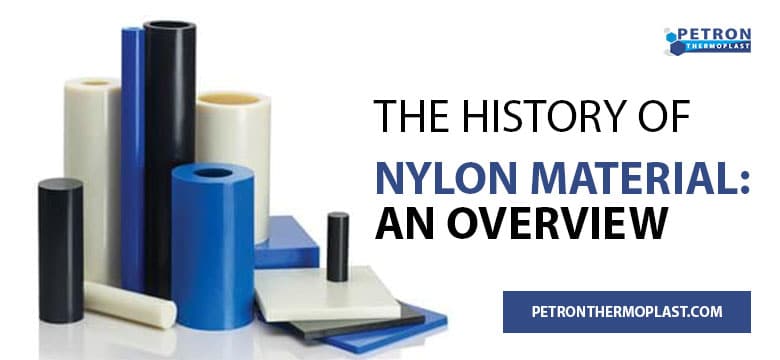
Nylon is one of the most versatile and widely used synthetic polymers in the world. It appears in everything from everyday clothing and household goods to high-performance industrial components. But what exactly is nylon, and what makes it such a popular material across so many industries?
In this post, we’ll take a closer look at what nylon is, how it’s made, and the Nylon material properties that make it stand out.
What Is Nylon?
Nylon is a synthetic thermoplastic polymer, first developed in the 1930s by Wallace Carothers and his team at DuPont. It belongs to a class of materials known as polyamides, which are polymers made up of repeating units linked by amide bonds.
Originally created as a silk substitute, nylon quickly gained popularity for its strength, flexibility, and resistance to wear. The first commercial use of nylon was in toothbrush bristles in 1938, followed by nylon stockings in 1940. Since then, its applications have expanded dramatically.
There are several types of nylon, the most common being:
-
Nylon 6,6 – Made from hexamethylenediamine and adipic acid
-
Nylon 6 – Made from caprolactam
-
Nylon 12, 11, 610, etc. – Variations based on different chemical building blocks
Each type has slightly different characteristics, but they all share core material properties that make nylon so valuable.
Material Properties of Nylon
1. High Tensile Strength
Nylon is known for its excellent strength-to-weight ratio. It can withstand a significant amount of tension and stress without breaking, making it ideal for applications such as ropes, straps, and structural parts.
2. Excellent Abrasion Resistance
One of nylon’s key strengths is its resistance to wear and friction. It holds up well against repeated rubbing or contact with rough surfaces. That’s why it’s often used in gears, bearings, and bushings in mechanical systems.
3. Good Elasticity and Flexibility
Nylon can stretch under pressure and return to its original shape, which makes it useful for fabrics, elastics, and molded parts that need to flex or bend without cracking.
4. Lightweight
Compared to metals or some rigid plastics, nylon is remarkably light. This makes it valuable in automotive and aerospace industries where weight savings are critical.
5. Low Coefficient of Friction
Nylon’s smooth surface and low friction properties make it a great choice for moving mechanical parts, such as pulleys and sliding components. It helps reduce wear and heat buildup.
6. Resistance to Chemicals and Oils
Nylon shows good resistance to many oils, greases, and some chemicals, especially hydrocarbons. This makes it suitable for use in fuel systems, engine components, and chemical-resistant parts.
7. Moderate Heat Resistance
Nylon can withstand moderate temperatures—typically up to about 180°C (356°F) depending on the grade. It’s suitable for applications that involve exposure to heat, though it may deform under higher temperatures if not stabilized.
8. Moisture Absorption
One drawback of nylon is that it absorbs water from the environment. This can cause slight dimensional changes and impact some mechanical properties, particularly in humid conditions. However, it also gives nylon better impact resistance than many dry plastics.
9. Electrical Insulation
Nylon is an effective electrical insulator, which is why it’s commonly used in electrical housings, cable ties, and connector parts.
10. Machinability and Moldability
Nylon is easy to machine, mold, and fabricate, which is why it’s widely used in custom CNC machining, injection molding, and 3D printing applications.
Common Applications of Nylon
Thanks to its wide range of material properties, nylon is used across numerous industries:
-
Textiles: Clothing, hosiery, sportswear, backpacks, and parachutes
-
Automotive: Gears, bearings, under-the-hood parts, and fuel system components
-
Industrial: Conveyor belts, machine parts, seals, bushings, and rollers
-
Consumer Goods: Toothbrush bristles, fishing lines, kitchen utensils, and zippers
-
Electrical: Wire insulation, connectors, and cable management products
Why Nylon Stands Out
What truly makes nylon remarkable is its balance of strength, flexibility, and chemical resistance. While other plastics might be tougher or more heat-resistant, nylon often provides the best all-around performance for both mechanical and everyday use.
Moreover, manufacturers can fine-tune nylon’s properties through additives like glass fibers (for increased strength), UV stabilizers, flame retardants, or plasticizers to match specific application needs.
Conclusion
Nylon isn’t just a fabric—it’s a high-performance material that has proven its value in both industrial and consumer applications. Its excellent mechanical strength, abrasion resistance, flexibility, and ease of processing make it one of the most widely used engineering plastics today.
Whether you’re working in product design, engineering, or manufacturing, understanding nylon and its material nylon properties can help you make smarter, more durable, and cost-effective material choices.